専任教員所属教員
英語
三浦 愛香 教授
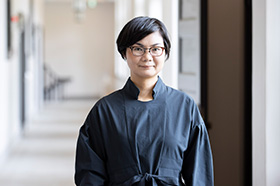
研究分野・専門:コーパス言語学/第二言語語用論/第二言語習得
これまでの研究:
海外でお土産を買う場面を思い浮かべると、英語が苦手なAさんと流暢に話せるBさんの英語には違いがあると容易に想像できるでしょう。私は、外国語学習者が発した言葉を収集したデータベース「学習者コーパス」を用い、日本人英語学習者が対話の場面に応じてどんな表現を使っているかを研究しています。コーパスは、前述のような我々の直感的な予想を統計的に解析した数値で裏付けてくれます。例えば、買い物での依頼の表現に注目すると、初級者は失礼な印象を与える可能性のある“I want…”を多用しますが、初中級者になると“I would like…”のようなより丁寧な表現が使えるようになり、中級者になると、wantの使用が低くなる一方、“Can/Could you…?”等の使用が高まる傾向が観察できます。
これまでの研究:
海外でお土産を買う場面を思い浮かべると、英語が苦手なAさんと流暢に話せるBさんの英語には違いがあると容易に想像できるでしょう。私は、外国語学習者が発した言葉を収集したデータベース「学習者コーパス」を用い、日本人英語学習者が対話の場面に応じてどんな表現を使っているかを研究しています。コーパスは、前述のような我々の直感的な予想を統計的に解析した数値で裏付けてくれます。例えば、買い物での依頼の表現に注目すると、初級者は失礼な印象を与える可能性のある“I want…”を多用しますが、初中級者になると“I would like…”のようなより丁寧な表現が使えるようになり、中級者になると、wantの使用が低くなる一方、“Can/Could you…?”等の使用が高まる傾向が観察できます。
アスクィス スティーブン M. 准教授
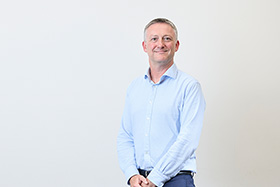
Research Field・Theme:Curriculum design/CALL and vocabulary
My research:
I am interested in designing and researching teaching practices which promote students’ creativity, autonomy, and 21st century skills. I have conducted research on using augmented reality for storytelling, student-created multimodal vocabulary flashcards, a collaborative Model United Nations unit, online versus in-person learning, and guessing in vocabulary tests. I like collaborating with others and I am always interested in researching new topics. I hope my research can help to develop materials and courses which give students the confidence and skills to thrive in the modern world.
My research:
I am interested in designing and researching teaching practices which promote students’ creativity, autonomy, and 21st century skills. I have conducted research on using augmented reality for storytelling, student-created multimodal vocabulary flashcards, a collaborative Model United Nations unit, online versus in-person learning, and guessing in vocabulary tests. I like collaborating with others and I am always interested in researching new topics. I hope my research can help to develop materials and courses which give students the confidence and skills to thrive in the modern world.
上野 育子 准教授
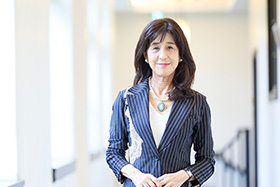
研究分野・専門:第二言語習得/Content and Language Integrated Learning (CLIL)/授業内言語使用/言語教師認知
これまでの研究:
私はこれまで第二言語習得領域のビリーフ研究として量的・質的な調査両方を含むmixed methods approach(混合研究法)を用いて日本人英語教師(NNEST)と大学生の授業内言語使用に対するビリーフ比較研究などを行ってきました。この研究の流れから現在はContent and Language Integrated Learning (CLIL)の領域で教授法や授業内英語使用・日本語使用に着目して研究を進めています。今後は異なる学部に所属し各々興味が違う英語学習者がどのように第二言語を習得していくのか、その際にどのような動機付けが必要であるのかをテーマに研究を進めたいと考えています。CLIL以外にもオンライン多読プログラムの研究など私の研究テーマは日々の授業実践と密接な関係にあり、授業実践者としての研究とも言えます。
これまでの研究:
私はこれまで第二言語習得領域のビリーフ研究として量的・質的な調査両方を含むmixed methods approach(混合研究法)を用いて日本人英語教師(NNEST)と大学生の授業内言語使用に対するビリーフ比較研究などを行ってきました。この研究の流れから現在はContent and Language Integrated Learning (CLIL)の領域で教授法や授業内英語使用・日本語使用に着目して研究を進めています。今後は異なる学部に所属し各々興味が違う英語学習者がどのように第二言語を習得していくのか、その際にどのような動機付けが必要であるのかをテーマに研究を進めたいと考えています。CLIL以外にもオンライン多読プログラムの研究など私の研究テーマは日々の授業実践と密接な関係にあり、授業実践者としての研究とも言えます。
シュロスブリー 美樹 准教授
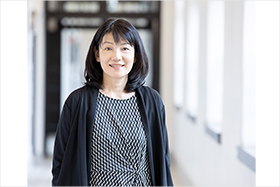
研究分野・専門:第二言語習得/音声学
これまでの研究:
これまで英語スピーキングの流暢さに関する研究をしてきました。主に二つの研究を行いました。一つは、母語の流暢さと第二言語の流暢さの関係についての研究です。日本語で流暢に話す人は、英語でも流暢に話すのだろかという内容です。もう一つの研究は、日本語と英語の発話速度を直接比較するために、異言語間発話速度比較研究を行ってきました。英語と日本語では音節構造が異なるので比較は難しいですが、バイリンガル話者の発話データを使用するという方法で、日英の発話速度を比べられないか探っています。
これまでの研究:
これまで英語スピーキングの流暢さに関する研究をしてきました。主に二つの研究を行いました。一つは、母語の流暢さと第二言語の流暢さの関係についての研究です。日本語で流暢に話す人は、英語でも流暢に話すのだろかという内容です。もう一つの研究は、日本語と英語の発話速度を直接比較するために、異言語間発話速度比較研究を行ってきました。英語と日本語では音節構造が異なるので比較は難しいですが、バイリンガル話者の発話データを使用するという方法で、日英の発話速度を比べられないか探っています。
町 沙恵子 准教授
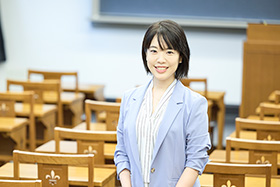
Research Field・Theme:Sociolinguistics/Pragmatics/Discourse analysis
My research:
I specialize in discourse analysis, especially the various conversational styles of different languages. Do Japanese and English speakers talk in a similar manner when they participate in a conversation? The answer is NO. Then how are these styles different? How can the speakers of the two languages understand each other and carry out a harmonious interaction when they are engaged in a conversation together? Because of its vast difference to English, Japanese conversational style is often viewed negatively, as though we are being illogical, ambiguous, or unproductive. Utilizing various conversation data, I have attempted to show the world that Japanese speakers carry out conversations in our own unique way to manage complicated relationships, and to create harmony in a conversation.
My research:
I specialize in discourse analysis, especially the various conversational styles of different languages. Do Japanese and English speakers talk in a similar manner when they participate in a conversation? The answer is NO. Then how are these styles different? How can the speakers of the two languages understand each other and carry out a harmonious interaction when they are engaged in a conversation together? Because of its vast difference to English, Japanese conversational style is often viewed negatively, as though we are being illogical, ambiguous, or unproductive. Utilizing various conversation data, I have attempted to show the world that Japanese speakers carry out conversations in our own unique way to manage complicated relationships, and to create harmony in a conversation.
マッキロイ タラ 准教授
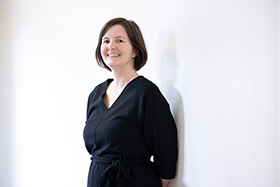
Research Field・Theme:Second Language Acquisition/literature in English
My research:
My research focuses on applied linguistics, second language acquisition, and the interpretation of literary works. Combining these three areas means exploring how it is possible to successfully respond to literature while developing proficiency in a second language. Reading is a personal activity that becomes socially connected and interactive when we talk about our reading experiences and emotions. Reading literature not only develops language but also develops an individual's perspective and way of understanding other cultures. Originally from the UK, my teaching background has been with English literature, including drama, poetry, and fiction. I completed my PhD in applied linguistics, focusing on second language learning using literature in English.
My research:
My research focuses on applied linguistics, second language acquisition, and the interpretation of literary works. Combining these three areas means exploring how it is possible to successfully respond to literature while developing proficiency in a second language. Reading is a personal activity that becomes socially connected and interactive when we talk about our reading experiences and emotions. Reading literature not only develops language but also develops an individual's perspective and way of understanding other cultures. Originally from the UK, my teaching background has been with English literature, including drama, poetry, and fiction. I completed my PhD in applied linguistics, focusing on second language learning using literature in English.
三島 雅一 准教授
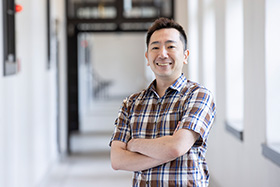
Research Field・Theme:TESOL/L2 writing/CALL/teacher agency/complexity theory/ecological approach
My research:
My research interests are everything about English language teaching & learning. Just like you wouldn’t want to eat the same dish every day, I like studying many different things. That said, my major research topic is L2 writing and other related areas. I am currently interested in exploring potential applications of what is largely defined as ecological approach, including socio-cultural theory, socio-materiality, social semiotics, and complexity theory, to language research and teaching.
My research:
My research interests are everything about English language teaching & learning. Just like you wouldn’t want to eat the same dish every day, I like studying many different things. That said, my major research topic is L2 writing and other related areas. I am currently interested in exploring potential applications of what is largely defined as ecological approach, including socio-cultural theory, socio-materiality, social semiotics, and complexity theory, to language research and teaching.
モリス サミュエル A. 准教授
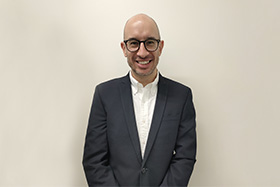
Research Field・Theme:Teacher education/Emotion regulation
My research:
I have long been interested in the psychology of language learning, and in my past research I have explored how classroom events might influence the emotional experiences of teachers and students. I am currently researching emotion regulation strategies, preparing a training programme for in-service teachers to recognise how their emotion management decisions influence learner outcomes. Most importantly, I am trying to understand how emotions can be regulated effectively to improve the ways that languages are taught and learnt.
My research:
I have long been interested in the psychology of language learning, and in my past research I have explored how classroom events might influence the emotional experiences of teachers and students. I am currently researching emotion regulation strategies, preparing a training programme for in-service teachers to recognise how their emotion management decisions influence learner outcomes. Most importantly, I am trying to understand how emotions can be regulated effectively to improve the ways that languages are taught and learnt.
ドイツ語
牛山 さおり 准教授
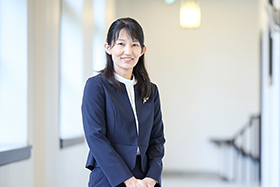
研究分野・専門:応用言語学/ドイツ語教育/音声教育
これまでの研究:
ドイツ語を母語とする幼児の言語獲得、日本語を母語とするドイツ語学習者の言語習得を主に研究しています。最近はドイツ語で行なわれる器楽レッスンの会話構造と特徴、学生—教員間のインタラクション、そして音や演奏をどのように言語化しているかを中心に分析しています。そのほかには、移民あるいは難民背景を持つ子供とその保護者への言語支援策、複言語教育など、ドイツ語を中心とした言語と社会のつながりにも興味があります。 教育面では特に音声教育に関心があり、学習者がいかにドイツ語らしい母音・子音、リズムおよびイントネーションなどの韻律的特徴を習得できるかに重点を置いた授業を展開していきたいと考えています。
これまでの研究:
ドイツ語を母語とする幼児の言語獲得、日本語を母語とするドイツ語学習者の言語習得を主に研究しています。最近はドイツ語で行なわれる器楽レッスンの会話構造と特徴、学生—教員間のインタラクション、そして音や演奏をどのように言語化しているかを中心に分析しています。そのほかには、移民あるいは難民背景を持つ子供とその保護者への言語支援策、複言語教育など、ドイツ語を中心とした言語と社会のつながりにも興味があります。 教育面では特に音声教育に関心があり、学習者がいかにドイツ語らしい母音・子音、リズムおよびイントネーションなどの韻律的特徴を習得できるかに重点を置いた授業を展開していきたいと考えています。
坂本 真一 准教授
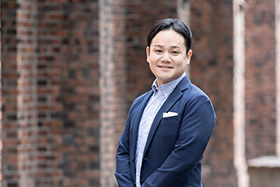
研究分野・専門:相互行為言語学/会話分析/音声教育
これまでの研究:
私たちが普段の生活で使っていることばが、会話の場面や状況、そして相手との関係性などの影響を受け、実際にどのように用いられているのかに興味を持っています。特に、ドイツ語の会話を対象に音声について研究しています。たとえば、会話の中でイントネーションやリズム、そしてポーズなどといったプロソディが、会話の構造化(話のまとまりの形成など)や会話の進行に関わるストラテジー(話順の調整、共感または話者の態度など)として、どのような機能を果たすのかについて分析しています。
また外国語教育では主に音声教育が専門です。最近では、専門教育と外国語教育の接点にも興味を持っており、「学術ドイツ語」の教育に関する研究も行っています。
これまでの研究:
私たちが普段の生活で使っていることばが、会話の場面や状況、そして相手との関係性などの影響を受け、実際にどのように用いられているのかに興味を持っています。特に、ドイツ語の会話を対象に音声について研究しています。たとえば、会話の中でイントネーションやリズム、そしてポーズなどといったプロソディが、会話の構造化(話のまとまりの形成など)や会話の進行に関わるストラテジー(話順の調整、共感または話者の態度など)として、どのような機能を果たすのかについて分析しています。
また外国語教育では主に音声教育が専門です。最近では、専門教育と外国語教育の接点にも興味を持っており、「学術ドイツ語」の教育に関する研究も行っています。
フランス語
関 未玲 教授
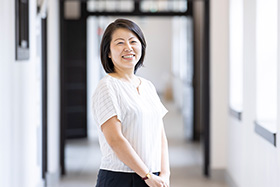
研究分野・専門:フランス20世紀女性文学/フランス語圏文学/フランス語教育
これまでの研究:
フランス20世紀女性文学を研究しています。破天荒な人生を送り、二つの大戦と戦後フランス社会の移り変わりを鋭い視線でとらえたマルグリット・デュラスの作品に描かれる「共生」について考えてきました。さらにデュラスと同じようにベトナムで生まれ、その後ボートピープルとしてフランス語圏カナダのケベック州にわたったキム・チュイの作品にみられる間文化的な視点についても研究を進めています。ケベックではカナダの多文化主義に対して、間文化に重きを置く文学作品が多く出版されています。また最近では、フランス語圏文学全般に関わるなかで、「明晰ならざるものフランス語にあらず」と言われるフランス語の教授法についても研究対象を広げています。
これまでの研究:
フランス20世紀女性文学を研究しています。破天荒な人生を送り、二つの大戦と戦後フランス社会の移り変わりを鋭い視線でとらえたマルグリット・デュラスの作品に描かれる「共生」について考えてきました。さらにデュラスと同じようにベトナムで生まれ、その後ボートピープルとしてフランス語圏カナダのケベック州にわたったキム・チュイの作品にみられる間文化的な視点についても研究を進めています。ケベックではカナダの多文化主義に対して、間文化に重きを置く文学作品が多く出版されています。また最近では、フランス語圏文学全般に関わるなかで、「明晰ならざるものフランス語にあらず」と言われるフランス語の教授法についても研究対象を広げています。
河野 美奈子 准教授
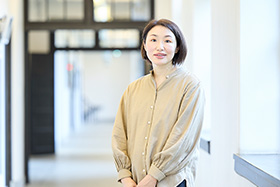
研究分野・専門:フランス語教育/フランス文学/複言語教育研究/異文化理解/ケベック先住民文学
これまでの研究:
私は、これまで20世紀フランスの女性作家マルグリット・デュラスについて研究してきました。とくに彼女がインドシナ(現在のベトナム)生まれである点に着目して、デュラスの自伝的作品を中心に読解を進めてきました。また、こうした研究と並行して、カナダのケベック州の先住民文学も研究しています。ケベック州で最も人口の多い先住民族イヌーの作家であるジョゼフィーヌ・バコンとナオミ・フォンテーヌを主な対象としています。彼女たちは、イヌーの言語とフランス語を併用し作品を紡いでいます。そこでどのように現代のイヌーの世界が描かれているのかに注目しつつ、言葉をめぐるさまざまな問題に取り組んでいます。
これまでの研究:
私は、これまで20世紀フランスの女性作家マルグリット・デュラスについて研究してきました。とくに彼女がインドシナ(現在のベトナム)生まれである点に着目して、デュラスの自伝的作品を中心に読解を進めてきました。また、こうした研究と並行して、カナダのケベック州の先住民文学も研究しています。ケベック州で最も人口の多い先住民族イヌーの作家であるジョゼフィーヌ・バコンとナオミ・フォンテーヌを主な対象としています。彼女たちは、イヌーの言語とフランス語を併用し作品を紡いでいます。そこでどのように現代のイヌーの世界が描かれているのかに注目しつつ、言葉をめぐるさまざまな問題に取り組んでいます。
スペイン語
泉水 浩隆 教授
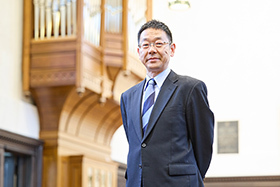
研究分野・専門:スペイン語学/スペイン語教育/スペイン語音声学(イントネーション、アクセントの知覚)/音声教育
これまでの研究:
私はこれまで、イントネーションやアクセントなど、スペイン語の韻律面を主な研究テーマとして扱ってきました。スペイン語は、日本人にとっては一般に発音しやすい・聞き取りやすい言語と考えられており、音声面にはあまり注意が払われて来なかった傾向があるように思われます。しかし、実際には、とっつきやすいからこそ、いつまでも基本的なエラーが残ってしまうという面もあります。現時点では、音声分析用コンピュータソフトウェアを用いて特定の条件に基づいて音声を加工して、スペイン語話者がどのようにスペイン語のイントネーションやアクセントを知覚しているかを分析するとともに、その結果から日本人スペイン語学習者が発音において留意すべき点を考え、音声教育に役立てる方法を探っています。また、授業実践の場で行った工夫を実際のテキスト作成・編集へどのようにリンクさせるかにも興味を持っています。
これまでの研究:
私はこれまで、イントネーションやアクセントなど、スペイン語の韻律面を主な研究テーマとして扱ってきました。スペイン語は、日本人にとっては一般に発音しやすい・聞き取りやすい言語と考えられており、音声面にはあまり注意が払われて来なかった傾向があるように思われます。しかし、実際には、とっつきやすいからこそ、いつまでも基本的なエラーが残ってしまうという面もあります。現時点では、音声分析用コンピュータソフトウェアを用いて特定の条件に基づいて音声を加工して、スペイン語話者がどのようにスペイン語のイントネーションやアクセントを知覚しているかを分析するとともに、その結果から日本人スペイン語学習者が発音において留意すべき点を考え、音声教育に役立てる方法を探っています。また、授業実践の場で行った工夫を実際のテキスト作成・編集へどのようにリンクさせるかにも興味を持っています。
松本 旬子 准教授
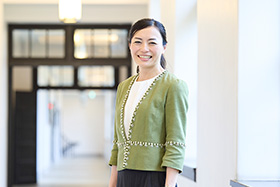
研究分野・専門:日本語母語話者へのスペイン語教育/スペイン語音声学
これまでの研究:
日本語母語話者によるスペイン語の聴取ならびに発音(日本語母語話者によるスペイン語の母音聴取、日本語母語話者のスペイン語の母音の発音ならびに子音間に見られる音挿入)の研究を主に行って来ました。研究を始めたきっかけは、日本語同様にスペイン語の母音は5つ、つづりはほぼローマ字読みで対応できるため、スペイン語の発音は日本語母語話者には容易であると一般的に考えられているわりに、流暢に話す人が意外と少ないと感じたためです(注:学習者が外国語を母語話者のように話せるようになるべきだと考えているわけでは決してありません)。研究結果を授業で活かし、学生の皆さんがスペイン語らしい音を身につけられる授業を目指しています。
これまでの研究:
日本語母語話者によるスペイン語の聴取ならびに発音(日本語母語話者によるスペイン語の母音聴取、日本語母語話者のスペイン語の母音の発音ならびに子音間に見られる音挿入)の研究を主に行って来ました。研究を始めたきっかけは、日本語同様にスペイン語の母音は5つ、つづりはほぼローマ字読みで対応できるため、スペイン語の発音は日本語母語話者には容易であると一般的に考えられているわりに、流暢に話す人が意外と少ないと感じたためです(注:学習者が外国語を母語話者のように話せるようになるべきだと考えているわけでは決してありません)。研究結果を授業で活かし、学生の皆さんがスペイン語らしい音を身につけられる授業を目指しています。
中国語
森平 崇文 教授
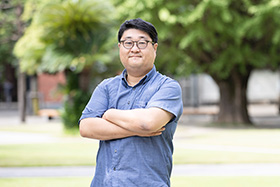
研究分野・専門:地域研究/芸術学
これまでの研究:
中国演劇と20世紀上海を研究しています。東洋と西洋、繁栄と搾取、正義と欲望が混在する20世紀の上海は「魔都」とも呼ばれるアジア有数の大都市でした。その上海での熱気に溢れる舞台、演技とオーラで魅了する役者、歓喜に酔う観衆、熱狂を煽るメディア、などを当時の資料を通じて調べています。また演劇を含む21世紀以降の中国語圏のメディアの動向にも強い関心があり、2016年以降はその年の中国演劇の動向を日本の読者に紹介する文章を発表しています。
これまでの研究:
中国演劇と20世紀上海を研究しています。東洋と西洋、繁栄と搾取、正義と欲望が混在する20世紀の上海は「魔都」とも呼ばれるアジア有数の大都市でした。その上海での熱気に溢れる舞台、演技とオーラで魅了する役者、歓喜に酔う観衆、熱狂を煽るメディア、などを当時の資料を通じて調べています。また演劇を含む21世紀以降の中国語圏のメディアの動向にも強い関心があり、2016年以降はその年の中国演劇の動向を日本の読者に紹介する文章を発表しています。
南雲 大悟 准教授
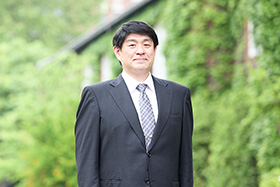
研究分野・専門:地域研究/表象文化論/中国語教育
これまでの研究:
中国の漫画について研究しています。漫画と言ってもコミック誌や電子書籍などでポピュラーな「ストーリー漫画」の類いではなく、主に新聞記事に添えられるような「政治諷刺漫画(1コマ~数コマ構成)」を対象に扱ってきました。その漫画が発表された当時の社会状況や時代背景をふまえつつ、作品自体における視覚表現の分析を軸に漫画家個人の価値観や作品内の視覚的メタファーの抽出などを試みました。また、中国語教育に携わる中で感じた日本人学習者による頻度の高い誤用実例をヒントに、理解を促すための教材作成や教授法の開発に取り組んでいます。その成果は教場に還元するほか、教科書や一般書のかたちで発表しています。
これまでの研究:
中国の漫画について研究しています。漫画と言ってもコミック誌や電子書籍などでポピュラーな「ストーリー漫画」の類いではなく、主に新聞記事に添えられるような「政治諷刺漫画(1コマ~数コマ構成)」を対象に扱ってきました。その漫画が発表された当時の社会状況や時代背景をふまえつつ、作品自体における視覚表現の分析を軸に漫画家個人の価値観や作品内の視覚的メタファーの抽出などを試みました。また、中国語教育に携わる中で感じた日本人学習者による頻度の高い誤用実例をヒントに、理解を促すための教材作成や教授法の開発に取り組んでいます。その成果は教場に還元するほか、教科書や一般書のかたちで発表しています。
朝鮮語
佐々木 正徳 教授
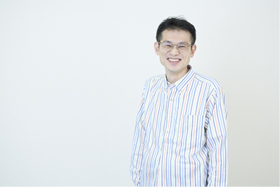
研究分野・専門:教育人類学/ジェンダー研究/外国語教育
これまでの研究:
韓国社会と韓国男性を主な対象としてジェンダー構造の分析を行っています。これまで、男性運動団体での参与観察研究、男性問題支援組織への訪問調査、特殊な服務で兵役を終えた男性への聞き取り調査、軍事施設・遺構への現地調査などを行ってきました。韓国は、男性に兵役の義務がある点、70年近く休戦状態が続く朝鮮戦争に関連する軍事施設が多数存在する点など、日本とは異なる視点で人類と平和について考えることのできる機会・場所がたくさんあります。そして、それらには社会のジェンダー観が反映されてもいます。個々人のジェンダー観と社会のジェンダー観の相互作用を垣間見ることで、人生と人類について考えを深めることが出来ると考えています。
これまでの研究:
韓国社会と韓国男性を主な対象としてジェンダー構造の分析を行っています。これまで、男性運動団体での参与観察研究、男性問題支援組織への訪問調査、特殊な服務で兵役を終えた男性への聞き取り調査、軍事施設・遺構への現地調査などを行ってきました。韓国は、男性に兵役の義務がある点、70年近く休戦状態が続く朝鮮戦争に関連する軍事施設が多数存在する点など、日本とは異なる視点で人類と平和について考えることのできる機会・場所がたくさんあります。そして、それらには社会のジェンダー観が反映されてもいます。個々人のジェンダー観と社会のジェンダー観の相互作用を垣間見ることで、人生と人類について考えを深めることが出来ると考えています。
金 恩愛 教授
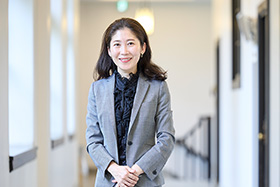
研究分野・専門:日韓対照研究/韓国語教育/教材開発
これまでの研究:
日本語と韓国語における表現様相の相違点の解明を中心テーマとします。韓国語と日本語は、同じ漢字文化圏という背景とともに、文法的な類似性もあって、両言語間に存在する表現様相の違いにはなかなか気づきにくい側面があります。私は、日本語と韓国語のこうした違いを、表現のあり方を問う表現様相という観点から捉えなおしています。表現様相という観点から見たとき、まず言えるのは、日本語は韓国語に比べ相対的に名詞的な表現が好まれ、韓国語は日本語に比べ相対的に動詞的な表現が好まれるという点です。こうした日韓表現様相論に立脚した研究成果は、言語教育にも応用できるものです。今後は、研究成果を、言語教育の現場にどのように還元できるか、教材作りや、辞書編纂、日韓翻訳という角度から考えていきたいと思います。
これまでの研究:
日本語と韓国語における表現様相の相違点の解明を中心テーマとします。韓国語と日本語は、同じ漢字文化圏という背景とともに、文法的な類似性もあって、両言語間に存在する表現様相の違いにはなかなか気づきにくい側面があります。私は、日本語と韓国語のこうした違いを、表現のあり方を問う表現様相という観点から捉えなおしています。表現様相という観点から見たとき、まず言えるのは、日本語は韓国語に比べ相対的に名詞的な表現が好まれ、韓国語は日本語に比べ相対的に動詞的な表現が好まれるという点です。こうした日韓表現様相論に立脚した研究成果は、言語教育にも応用できるものです。今後は、研究成果を、言語教育の現場にどのように還元できるか、教材作りや、辞書編纂、日韓翻訳という角度から考えていきたいと思います。
